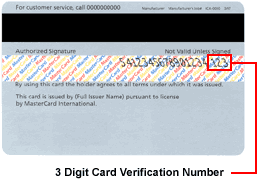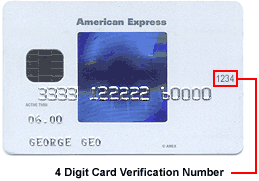Card verification codes can be found:
- This is a special encryption used by VISA, MasterCard and American Express to prevent fraud. Should you not be using a VISA, MasterCard or American Express card please ignore the CVV field.
- It is a three-digit identifier printed on the signature strip on the back of the card.
- CVV is VISA's Card Verification Value and CVC is MasterCard's Card Verification Code
- CVV is printed on the front of American Express card.


If you have any further questions about the location of this number, please call your credit card issuer for assistance.